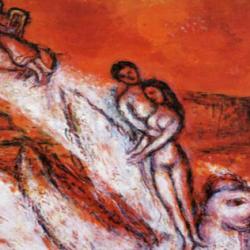Proverbs 5:15-23 follows the warnings of 5:1-14 concerning the seductive adulterous woman. The adulterous woman tempts by promising pleasure and, even more importantly, through flattery (vv. 2-3). The adulterous woman is attractive because she makes a young man feel oh so good about himself. Solomon goes on, however, to point to the deadly consequences of listening to her flattery (vv. 4-6). The adulterous will leave her victim enervated and penniless (vv. 10-11), grieving over his folly (vv. 12-14).
When Solomon turns to describing the sexual life that his son should pursue, he suddenly begins to employ poetry. He describes love-making in terms of “water” and “cisterns” and “springs”; he does refer to a woman’s breasts, but also describes her as a “graceful doe.”
From Adam on (Genesis 2), licit sex is described in Scripture with poetry (see especially the Song of Songs). Illicit sex is described in graphic and even obscene terms, but godly sex is never described in these clinical much less vulgar terms.
Poetry is the appropriate medium for a description of sex; sex itself is a created metaphor, a symbol of the union of Christ and His church, and poetry highlights its mystery and depth. One of the worst things about the pornography is its reduction of sexuality to bodies and fluids. Pornography is the polar opposite of poetry; by exposing, pornography destroys all mystery.
As Bruce Waltke says, Solomon uses virtually exhausts the Hebrew vocabulary for water sources (vv. 15-16): cisterns, wells, springs, streams of water. What is he referring to? Waltke suggests that the imagery is mainly imagery of refreshment. Quoting another commentator, he says, “The image suggests cool, limpid refreshment for hot desires, which are slaked by ‘drinking,’ that is, lovemaking.” The woman is thus being portrayed as the source of refreshing waters, and the son’s desire is satisfied by sex in the way thirst is satisfied by cold water.
Solomon’s connection between drink and sex is significant. Scripture frequently connects food and sex (several times in Song of Songs), and this points to the fact that both involve “one flesh” relationships. When we both eat from the same roast, or the same table, we are “one” through that common meal. Obviously, another connection is the connection of sexual desire and hunger, as well as the analogy between the multi-sensory pleasures derived from eating a well-prepared meal and the pleasures of sex.
Solomon’s exhortation is to “drink water from your own cistern.” The imagery of verse 16 is somewhat puzzling; it reads, “Should your springs overflow?” and the question expects a negative answer. The “spring” is sometimes seen as a symbol of a man’s sexual potency, and that is sometimes connected with the promise of descendants. But the imagery seems to be simply an extension of the exhortation of verse 15; the “springs” refer to water-sources other than “your own cistern.” The contrast throughout is between finding satisfaction for one’s thirst from one’s private cistern, and finding satisfaction from water-sources in the open square.
P.A. Kruger “The whole allegory rests on the matter of private versus common property: one’s own cistern (v. 15) as against the springs and channels of water in the open squares (v. 16); the water that belongs to you alone (v. 17) in opposition to those in open places that are property of foreigners” (quoted in Waltke, 319). Solomon is saying, When you are hot with desire, look in only one place to satisfy your thirst – to your own fountain, cistern, and well, your wife.
Our culture is full of public cisterns, where sexual satisfaction is offered apart from the inhibitions of marriage and family. One of the key features of modern culture, in fact, has been the liberation of sex from all the traditional ties and boundaries that used to surround it with an aura of sanctity.
“Water” is offered on the Internet, and in pornographic magazines. Sexually liberated women are (ironically enough) willing to accommodate themselves to the traditionally male sexual preference for anonymous, uncommitted sex. For slightly more money, you can find “water” on street corners in every major city in the US. Adultery is still scandalous for a politician, and sometimes discouraged; but it is not seen as an inherent evil. If, perchance, sex should result in pregnancy, we have options there too.
Solomon’s solution to the temptations that public cisterns offer is to urge his son to return to his private cistern. Why drink water from a cistern that has already been used by others (v. 17)? Why get drunk on passion for a strange woman? (v. 20).
Changing the image from water to wine, he encourages his son to be “intoxicated” with his own wife (v. 19), whose love is “better than wine” (Song of Songs 1:2). “Satisfy” in verse 19 means “drink one’s fill” or “saturate,” and thus continues the imagery of the woman as a source of refreshing drink.
Solomon ends this exhortation with a reminder that nothing is hidden from God. Secret sexual sins are not secret to God (v. 21). And God will ensure that those who follow the strange woman are captured and held fast in the cords of their sins. Sexual sin is folly ultimately because, no matter how vital and invigorating it may feel, it is an enemy of life.












